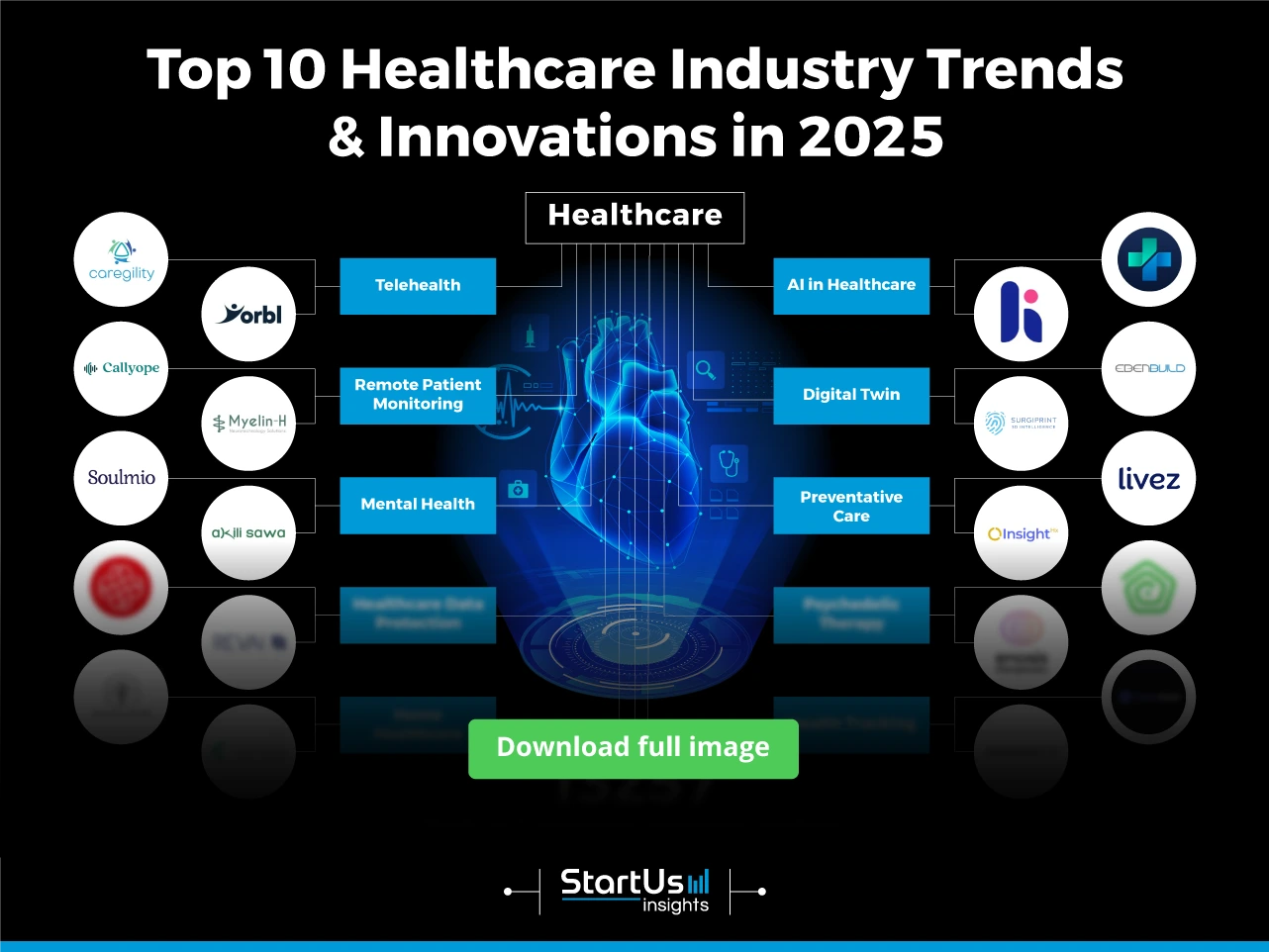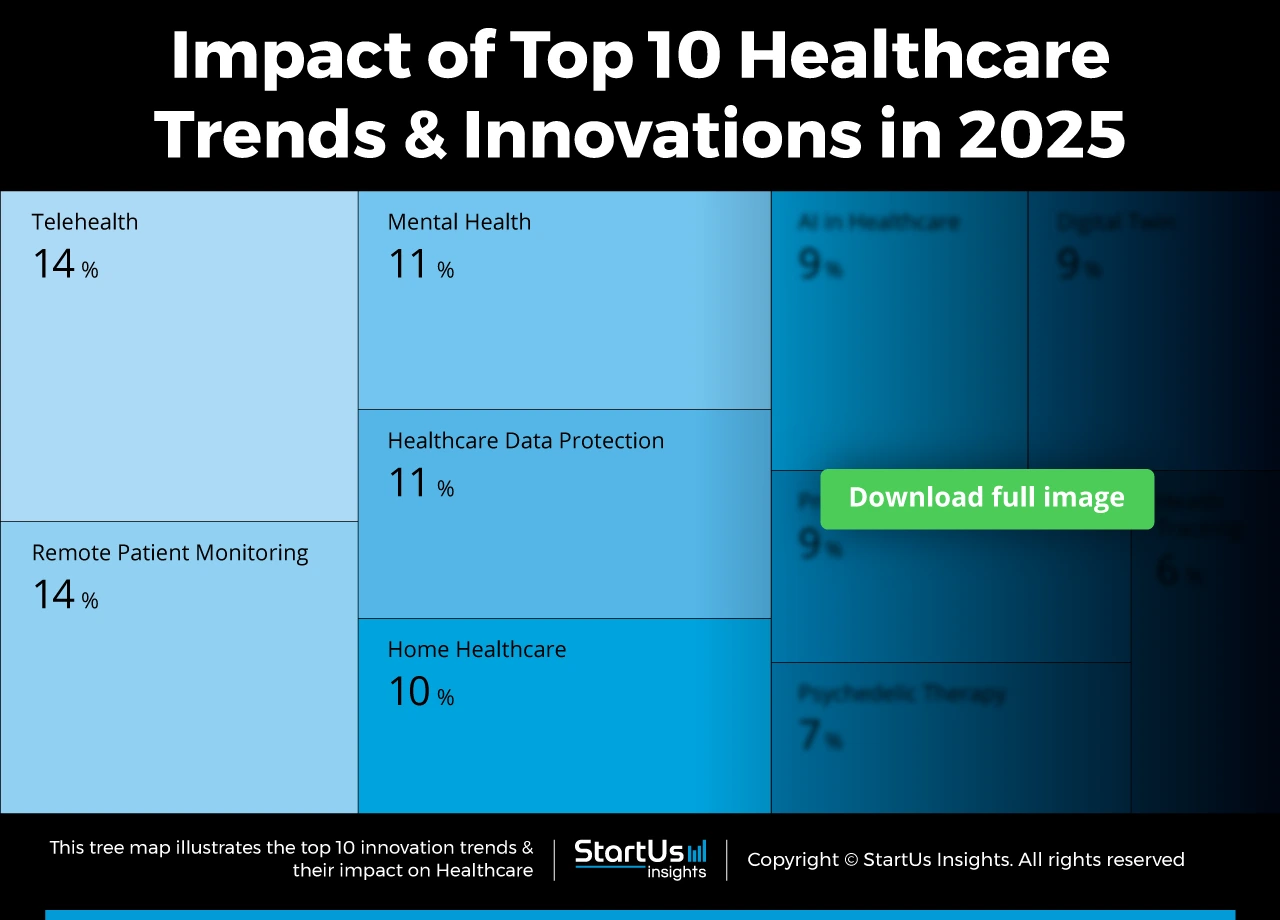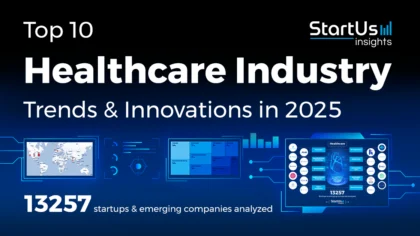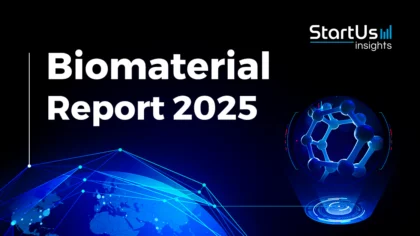Are you looking to explore how the top technological trends are bringing a paradigm shift into the healthcare sector? AI-powered diagnostics improve precision in medical evaluations, and telehealth platforms remove physical barriers to care. Remote monitoring technologies provide real-time data for managing chronic conditions and improving patient care. Personalized medicine provides better treatment outcomes by tailoring therapies to individual genetics. Wearable health devices offer continuous tracking and proactive care. Blockchain technology secures patient information, while robotics and automation deliver convenient surgical practices. Lastly, machine learning-based solutions boosts predictive analytics for timely interventions and better prevention. Explore how the top healthcare industry trends are powering a new wave of startups, each bringing a change in the future of healthcare.
What are the Top 10 Healthcare Trends in 2025?
Innovation Map outlines the Top 10 Healthcare Industry Trends & 20 Promising Startups
For this in-depth research on the current trends in healthcare, we analyzed a sample of 13257 global startups & scaleups. This data-driven research provides innovation intelligence that helps you improve strategic decision-making by giving you an overview of emerging technologies in the healthcare industry. In the Healthcare Technology Trends & Innovation Map, you get a comprehensive overview of the innovation trends & startups that impact your company.
These insights are derived by working with our Big Data & Artificial Intelligence-powered StartUs Insights Discovery Platform, covering 4.7M+ startups & scaleups globally. As the world’s largest resource for data on emerging companies, the SaaS platform enables you to identify relevant technologies and industry trends quickly & exhaustively.

Tree Map reveals the Impact of the Top 10 Healthcare Trends
The Tree Map highlights the vital healthcare industry trends that are shaping 2025. The importance of digital health technologies, such as telehealth and remote monitoring, reflects their role in improving patient care and managing chronic conditions. The increase in AI applications across diagnostics and personalized medicine shows the sector’s shift towards data-driven insights for tailored treatment plans.
Progress in wearable devices is changing patient monitoring and health management. The adoption of blockchain technology in healthcare systems boosts data security and interoperability. Besides, precision medicine advances with developments in genomics and personalized therapies targeting individual patient needs. As healthcare systems adapt to these trends, the focus moves toward advanced technologies to ensure better care outcomes.

Global Startup Heat Map covers 13200+ Healthcare Startups & Scaleups
The Global Startup Heat Map below highlights the global distribution of the 13257 exemplary startups & scaleups that we analyzed for this research. Created through the StartUs Insights Discovery Platform, the Heat Map reveals high startup activity in the USA and UK, followed by Australia and Canada.
Below, you get to meet 20 out of these 13257 promising startups & scaleups as well as the solutions they develop. These healthcare startups are hand-picked based on criteria such as founding year, location, funding raised & more. Depending on your specific needs, your top picks might look entirely different.

Want to explore all healthcare innovations & trends?
Top 10 Trends in Healthcare (2025)
1. Telehealth
Telehealth improves access to care in rural areas using wearable devices and home-based sensors for continuous monitoring and early intervention in chronic conditions. Tele-ICU services let specialists remotely monitor ICU patients and provide care from anywhere. Virtual consultations manage patient loads by allowing doctors to offer advice and treatment remotely. Mobile health apps also give patients easy access to medical information, appointments, and medication reminders. These solutions improve care and patient engagement by addressing healthcare challenges early.
Caregility streamlines Virtual Patient Care
US-based startup Caregility provides an integrated telehealth solution through its Caregility Cloud by merging bedside care, virtual care, and AI capabilities at the point of care. The company employs intelligent telehealth devices and applications to provide virtual nursing, observation, and engagement. Its Virtual Care Platform and Care Applications support patient interactions and clinical management. Caregility’s connected ecosystem includes devices to reinforce its telehealth consulting services. By combining these elements, the company refines clinical insights, patient safety, and operational efficiency. It also includes AI-powered hybrid care and a broad deployment across more than 1000 hospitals.
Yorbl simplifies Telehealth for Senior Citizens
Yorbl is a UK-based startup that offers the YorblVita range, which includes app-based telecare solutions that integrate with YorblVitaTab, an Android tablet tailored for senior citizens with built-in telecare functionality. The company also provides the YorblHub, which has features like warden call, door entry, video calling, and smart home control with extensive telecare capabilities. Yorbl Vita, an entry-level digital dispersed alarm, offers cost-effective personalized telecare, while the Yorbl Vita+ offers rich digital telecare adhering to stringent quality standards. Additionally, its sensors and peripherals capture valuable data about user activity and surroundings. By integrating these diverse technologies, Yorbl uplifts telehealth management and patient care.
2. Remote Patient Monitoring
Remote Patient Monitoring (RPM) mitigates fragmented patient management and data accuracy issues with real-time data collection and analytics. Continuous glucose monitors (CGMs) measure glucose levels in real time for immediate adjustments to insulin therapy and better diabetes management. Wearable ECG captures cardiac data for early detection of arrhythmias and timely interventions. Connected inhalers also track medication usage and respiratory symptoms for better asthma management. Additionally, RPM bridges the gap between in-person and remote care by improving efficiency and effectiveness.
Callyope advances Voice-based Psychiatric Care
Callyope is a startup from France that provides a remote patient monitoring technology for psychiatric care through voice-based analysis. It uses a one-minute voice test that is conducted on a smartphone, whether in a clinical setting or at home, to capture and analyze speech patterns. This analysis predicts psychiatric clinical scores, evaluates fatigue, and estimates cognitive deficits for a detailed view of brain health. The solution tracks the progression of psychiatric disorders to prevent relapses, reduce rehospitalization rates, and customize treatments. Callyope thus offers an accessible method for ongoing patient assessment and treatment adjustment for quality psychiatric care.
Myelin-H enables Remote Brain Health Assessment
UK-based startup Myelin-H has a brain-computer interface technology that allows remote brain health assessment and neurorehabilitation. The company has cognitive games, visor-like sensors, and artificial intelligence to monitor and support brain health. Its technology employs a closed-loop brain-machine interface to deliver personalized neurotherapeutic programs and clinical insights for real-time, non-invasive monitoring and rehabilitation. By addressing neurological disorders such as multiple sclerosis, Myelin-H offers an exhaustive solution for brain health management to deliver therapeutic benefits and diagnostic capabilities from any location at any time. Its platform provides a practical approach to building brain health through neurotechnology.
3. Mental Health
Mental health technology addresses limited access to therapists and long wait times by offering accessible therapy and counseling services. Different mental health platforms tackle the shortage of professionals and expand patient reach. Mental health monitors track stress and mood in real-time. Psychedelic therapies, Trauma-Informed Care (TIC), and blood tests for mental illness redefine care. Also, virtual reality and Transcranial Magnetic Stimulation (TMS) provide non-invasive treatments for PTSD and depression. These solutions improve patient engagement, care continuity, and accessibility.
Soulmio offers Digital Solutions for Mental Health and Workplace Productivity
Based out of Czech Republic, Soulmio is a stratup that provides an online mental health care program tailored for companies. Its exhaustive services include online psychological counseling, an educational portal, webinars, workshops, mental health days, and much more. The company’s technology allows employees to access various forms of mental health support from a single platform, catering to both immediate counseling needs and proactive education. It offers customized content, training for HR and managers on workspace mental health, and multilingual support in Czech, English, and Spanish. Soulmio fosters a caring and inspiring online space where individuals feel heard, and accepted, and receive the psychological assistance they require.
Akilisawa creates Easy-to-Access Mental Health Solutions for All Businesses
Akilisawa is a US-based startup that provides productive mental wellness solutions for the workplace. It offers precision mental health assessments, personalized care plans, direct scheduling, and digital cognitive behavioral therapy. The company’s tools align the process of accessing mental health care, allowing for tailored interventions and direct support. It comprises detailed analyses and moment-based digital therapy, which work positively on the effectiveness of mental health initiatives. The key benefit of the company’s platform is the empowerment it offers to businesses in taking proactive steps toward supporting the mental well-being of their workforce.
4. Digital Health Record
Digital Health Records (DHR) is improving patient data management and clinical workflows. Cloud-based storage, artificial intelligence (AI) for predictive analytics, blockchain for data security, and interoperability frameworks improve the trend’s functionality. Cloud-based storage offers scalable and secure data access to receive real-time updates. AI-driven predictive analytics identify patient risks and suggest personalized treatment plans. Interoperability frameworks allow fast data exchange between diverse healthcare systems to tackle fragmented patient information issues. These technologies reduce redundancies and encourage healthcare providers to render more coordinated care.
Afya Rekod works as a Digital Hub for Personal Health Management and Wellbeing
AfyaRekod is a startup from Kenya that provides a blockchain-based digital health platform that securely stores individual health information while allowing easy interaction with healthcare professionals. The platform works by using blockchain technology for data integrity and privacy, allowing users to access and manage their health records in real-time. It also offers tools for users to engage with verified health information, facilitating informed decisions about their well-being. Additionally, its encrypted storage feature, real-time access, and detailed interaction system scale up personal health management.
Revai develops AI-driven Electronic Health Record Systems
US-based startup Revai is building a web-based Electronic Health Record System for better patient information management. It integrates AI, analytics, big data, and automation to improve the patient experience and support doctors in managing every aspect of patient care. Revai’s EHR system is highly configurable, easy to use, multi-centric, and is a one-stop surgical planner. By using collective intelligence and a shared medical database involving universities, physicians, and laboratories, Revai is making current medical practices better while driving technological development in healthcare.
5. Home Healthcare
Home healthcare technology uses AI-powered diagnostic tools for rapid patient data analysis and early health issue detection. Smart medication dispensers ensure prescription adherence and alert patients and caregivers about missed doses. Telemedicine services reduce the burden on physical facilities through virtual consultations. Wearable health monitors track vital signs and activity levels in real-time for immediate insights into a patient’s condition. Robotic-assisted care systems aid patients with mobility challenges and provide in-home support. These technologies improve care delivery and optimize healthcare resource use.
Sihata Care develops a Home Healthcare Management Platform
Canadian startup Sihata Care improves home healthcare with its platform that integrates client and case management, mobile workforce management, automated and AI-driven scheduling, and funding/payee management. It aligns operations by coordinating these essential components for a smooth workflow for home health agencies. The platform features flexible scheduling options, including fixed shifts, recurring schedules, and on-demand appointments to meet diverse care needs. It also includes an automated workflow feature that matches caregivers with clients for continuity of care, reminder alerts to prevent missed visits, and tools for clinical assessments and care planning.
Narrable simplifies Automated Billing for Home Healthcare
Narrable is a startup from the US that develops an AI-powered platform to simplify home healthcare. It offers clinical solutions and automated financial systems for home health providers to operate more smoothly. It reduces annual inefficiencies considerably by allowing real-time intelligence and easy billing and collection processes. This technology eliminates double data entry and supports clinicians in focusing more on patient care.
6. AI in Healthcare
Deploying AI in healthcare addresses biases in resource management, disease prediction, and diagnostic accuracy. AI-driven diagnostic imaging quickly identifies tumors and fractures to support predictive analytics and personalized treatment plans. AI-powered chatbots assist with virtual health support, while AI accelerates drug discovery through large dataset analysis. AI also predicts patient admissions and disease outbreaks to manage workforce shortages and improve healthcare delivery. These solutions reduce costs, improve patient outcomes, and expand access to services.
AI Medical Technology designs a Clinical Decision Support Tool
Swedish startup AI Medical Technology provides Dermalyser, a clinically validated decision support tool for diagnosing skin cancers. Dermalyser uses artificial intelligence to classify skin cancer types, including malignant melanoma, through image analysis and deep learning. The system analyzes quality-controlled dermatoscopic images of skin lesions alongside patient data to deliver diagnostic results in seconds. This approach reduces waiting times and patient anxiety while supporting frontline healthcare practitioners with a reliable and efficient diagnostic solution. AI Medical Technology also improves the accuracy and speed of skin cancer diagnosis, ultimately improving patient outcomes and the diagnostic process.
Heidi develops an AI-powered Medical Scribe
Heidi is an Australian startup that automates clinical tasks such as note-taking, insurance verification, and results retrieval. The company provides an AI-powered medical scribe that integrates with existing systems for aligning administrative workflows. Its technology includes features like context, which allows users to make mid-visit adjustments to notes without speaking, and customizable note structures that adapt to individual styles. The solution reduces the administrative burden on clinicians, improves efficiency, and maintains hospital-grade security. Heidi thus supports healthcare professionals by simplifying documentation processes and improving overall patient interactions.
7. Digital Twin
Digital twin technology addresses patient variability in treatment responses, aligns chronic condition management, and improves risk assessment. Real-time simulations allow healthcare providers to predict individual responses to treatments and customize interventions. Continuous updates to virtual models with real-time data from wearables support proactive chronic disease management. The technology also uses predictive analytics to model treatment and surgical outcomes. Besides, MRI and CT scans provide detailed anatomical data for accurate digital twins.
Ebenbuild advances Patient-Specific Simulation Models
Based out of Germany, Ebenbuild is a startup that develops patient-specific simulation models of lungs to provide respiratory care. It creates these models using a combination of physics-based simulation, artificial intelligence, and data science. This allows for accurate and personalized lung simulations based on patient data. The platform supports decision-makers in the life sciences industry, as well as clinicians and physicians with detailed insights into patient-specific lung conditions. Its application in clinical decision support and silico trials for respiratory drug delivery provides precise and personalized health intelligence.
Surgiprint builds 3D Surgical Planning & Visualization Tools
Surgiprint is a Belgian startup that provides a surgical planning and support platform using 3D segmentation technologies. It offers digital 3D models accessible on any device, along with augmented reality, virtual reality, and physical 3D printed models. These developments aid in surgical preparation and execution. The technology allows precise visualization and interaction with anatomical structures for surgical accuracy and effectiveness. Its solution is composed of multiple visualization methods and customizable models for specific surgical needs. Additionally, Surgiprint improves surgical outcomes with versatile, high-quality planning tools that support surgeons throughout the entire operative process.
8. Preventative Care
Preventive care tackles infectious disease outbreaks, debilitating conditions, and chronic condition management. Vaccination programs and health screenings prevent diseases and detect them early. Lifestyle counseling fosters healthier habits, while genetic sequencing provides detailed insights into an individual’s genetic makeup. Smart health sensors continuously monitor health metrics and provide actionable data for early intervention and ongoing health management. Wearable devices play a vital role in preventive care in real-time. Additionally, preventive care manages resources more efficiently and reduces the need for emergency and specialty care services.
Livez enables Mobile-based Healthcare Screening
US-based startup Livez offers a new approach to preventive care with its autonomous prevention solution. The technology turns mobile phones into screening devices for users to perform health screenings in over 50 clinical domains. Using clinically validated AI, Livez provides personalized, predictive prevention measures directly from mobile devices. This method improves accessibility and convenience, providing real-time health insights and early detection. In addition, Livez develops preventive medicine by integrating technology into everyday mobile use for easy health management and well-being.
InsightHx develops a Personalized Care Platform
InsightHx is a Canadian startup that provides an end-to-end personalized care platform for clinicians. It integrates with certified EMRs through TurmericTM, extracting essential information to facilitate tailored care. The platform features actionable insights, delivering recommendations that empower health teams to improve preventive care quality. With quality intake capabilities, it automates personalized communications to prioritize patients needing preventive care. The care survey feature updates patient records by gathering information on screenings, vaccinations, and medical status. By offloading administrative tasks from doctors to health admins, the platform boosts clinic efficiency. Automated reminders that use personal health data for preventive care events are not overlooked.
9. Psychedelic Therapy
Psychedelic therapy handles treatment-resistant depression, limited patient engagement, Post-Traumatic Stress Disorder (PTSD), and more. This therapy addresses PTSD by allowing patients to confront and process traumatic experiences in a supportive setting. Additionally, it overcomes the barrier of limited patient engagement and adherence by improving therapeutic outcomes. For instance, studies involving psilocybin show marked improvements in patients with treatment-resistant depression while MDMA-assisted therapy demonstrates promise in reducing PTSD symptoms. This approach provides new therapeutic avenues and shifts the focus from managing symptoms to addressing underlying causes.
Homecoming designs a Therapy Management Platform
Canadian startup Homecoming offers a platform for therapists to improve their practice, simplify administrative tasks, and support business growth. The solution integrates various tools into a single platform for providers to manage client interactions, scheduling, and business operations effectively. It aligns communication by integrating email, text, and app interactions to manage client dialogues. The platform also consolidates scheduling, billing, and resource sharing, which simplifies administrative tasks and eliminates the need for multiple separate tools. Homecoming addresses the specific needs of holistic health practitioners and their clients through a unified interface.
Enosis Therapeutics advances VR-based Psychedelic Therapy
Australian startup Enosis Therapeutics combines psychedelic psychotherapy with virtual reality to improve therapeutic outcomes. The company uses clinical protocols that integrate targeted VR scenarios at specific stages of psychedelic-assisted therapy. This approach modulates internal and external factors, which improves the quality of the patient experience. By adding VR environments to clinical trials and therapy sessions, Enosis supports psychedelic research and creates more effective treatment experiences. Additionally, the company develops psychedelic therapy by merging immersive technology with therapeutic practices to optimize patient results and the therapeutic process.
10. Health Tracking
Health tracking technologies improve healthcare with real-time monitoring and precise data. Continuous glucose and wearable ECG monitors offer insights for timely interventions. Smart bandages track wound conditions and infection risk. Biometric authentication devices secure personal health data with fingerprint or iris scans. Additionally, devices with fall detection for the elderly and sleep pattern analysis improve overall health management. Integrating these technologies into daily care boosts patient outcomes and optimizes treatment processes.
Proton Health enables AI-led Dermatological Symptom Tracking
Proton Health is a startup from the US that leverages AI for dermatological care with its DermX and SkinX platforms. DermX provides instant consultation summaries, access to a leading assistant, and patient insights for clinical accuracy and to reduce administrative burdens. SkinX, a companion app, delivers holistic patient care through self-management content, behavioral therapy, and symptom tracking. Proton Health transforms clinical practice to boost efficiency and patient satisfaction. It also allows dermatologists to provide more effective care while minimizing administrative tasks.
Somareality uses Eye-Tracking Data for Brain Function Insights
Austrian startup Somareality develops digital neuropsychology by using eye-tracking data to offer brain insights. It creates cognitive digital biomarkers that monitor brain function continuously. By analyzing eye movements, the company generates scientifically validated data that provides a deep understanding of cognitive processes and mental health. These digital biomarkers offer unique insights into brain performance and potential issues for a more nuanced approach to neuropsychological assessment. By digitizing neuropsychology, the company bridges the gap between brain and cardiovascular health for more effective monitoring and intervention.
Discover all Healthcare Innovations Technologies & Startups
The technological trends discussed in this report are just a glimpse into the disruptive solutions transforming the healthcare sector. To stay ahead of the curve in your field and for a deeper understanding, download our Healthcare Technology Report now or feel free to reach out for an in depth analysis of the latest advancements and their potential effects on your organization in 2025.
The Healthcare Industry Trends & Startups outlined in this report only scratch the surface of trends that we identified during our data-driven innovation & startup scouting process. Identifying new opportunities & emerging technologies to implement into your business goes a long way in gaining a competitive advantage.










